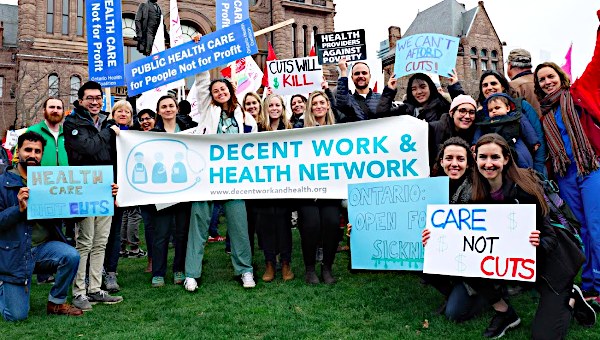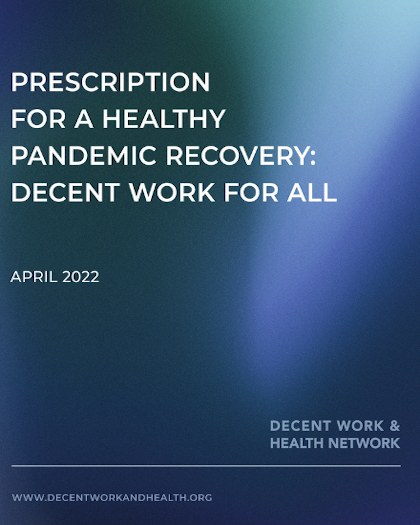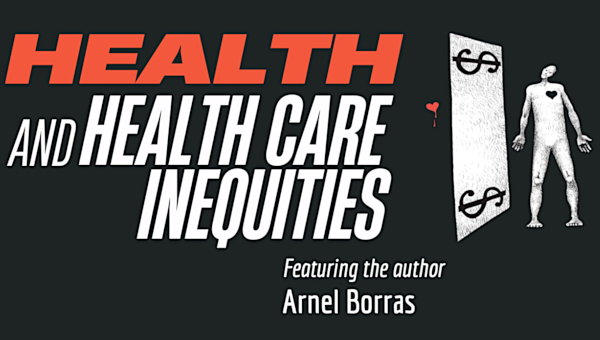Decent Work for All is the Prescription for a Healthy Pandemic Recovery
As Ontario enters the sixth wave of COVID, almost all public health restrictions have been lifted. It’s well established that precarious employment has been a key driver of the pandemic. Workers in low-wage, precarious jobs still don’t have access to permanent protections. The failure of the Doug Ford government to improve working conditions has widened existing health inequities disproportionately impacting racialized, women and migrant workers.
The Decent Work Health Network (DWHN), a network of providers across Ontario, released a report this week that delivers recommendations for improving work conditions as a health issue and public health imperative. The report, Prescription for a Healthy Pandemic Recovery: Decent Work for All, is foundationally based on interviews with frontline healthcare workers as well as medical and public health evidence from before and during the COVID-19 pandemic. It is a solid, evidence-based report. The report is grounded on three pillars that include wages and hours; paid sick days; and workplace protections.
The report also calls for the provincial government to establish a minimum wage floor of $20 per hour; equal pay for equal work; promote full-time and permanent jobs; ten paid sick days annually, plus an additional 14 paid sick days during a pandemic; status for all; just cause protection to prevent wrongful dismissal; an end to misclassification that plagues Gig workers; and access to a union.
Raise Minimum Wage to $20 an Hour
According to Debra Slater, Personal Support Worker (PSW) at a long-term care (LTC) facility, “We are not getting what we’re worth. Employers and management make PSWs feel like if we speak up, we will lose our jobs. And, many workers don’t have any other way of making a living. We need a minimum wage floor of at least $20 an hour.”
Private, for-profit LTC facilities pay PSWs the lowest wage, $16.50 per hour. They hire employees on a part-time basis to avoid paying benefits. They also have the lowest PSW to client ratios. Not surprisingly, they have had the highest average death rates, 5.7 per cent, during COVID.
PSW pay and staffing ratios are better at not-for-profit LTC. These facilities had an average death rate of 2.8 per cent. Municipal LTC facilities not only had the highest wages and staffing ratios, their average death rate was 1.4 per cent.
Wage incentives during the pandemic only applied to PSWs providing publicly funded services in LTC, home and community care, public hospitals and social services. These incentives, ranging from $2 to $3 per hour, did not bring workers up to a living wage and have not been made permanent.
“One of the things we do at DWHN is to take the lead from and to amplify the demands of these work movements through a health lens,” said Dr. Jesse McLaren, Emergency physician and member of DWHN during a recent interview.
DWHN reviewed the evidence behind the demand for a $20 minimum wage and agreed with that in terms of addressing a key social determinant of health. Hence, the establishment of a minimum $20 floor to help lower the racialized, gendered and migrant worker wage gap. Evidence shows that higher wages ensure better access to more nutritious food and safer housing. That in turn leads to lower rates of illness. It also ensures better access to care when these workers become ill.
Permanent, full-time employment means PSWs no longer have to take two or three part-time positions with different employers. This not only averts cross-contamination between LTC facilities during a pandemic, it also ensures workers don’t have to work seven days a week just to make ends meet.
According to the Canadian Centre for Policy Alternatives (CCPA) report, “Another Year in Paradise: CEO Pay in 2020,” each of the top 100 Canadian Chief Executive Officers took home an average of $10.9-million in 2020. That is 191 times more than the average Canadian worker earned.
Driving the Pandemic
The DWHN 2022 report documented that 3.4 million Canadians have been infected by COVID in the past two years. Over 37,000 Canadians have died in that time. Precarious work has been a key driver of the pandemic and is a real health hazard. These workers have been left behind during the pandemic due to non-existent workplace protections.
DWHN is the culmination of taking the lead from both the Worker’s Action Centre which advocates for low-wage workers and Health Providers Against Poverty (HPAP) a group of healthcare providers advocating for the social determinants of health to address poverty and its impact on health.
DWHN was advocating for permanent paid sick days, full status and misclassification, and an end to doctor’s notes well before the onset of COVID. So, it’s not such a stretch to see why these determinants of health have become even more important driving forces during the pandemic.
Prescription for a Healthy Pandemic Recovery: Decent Work for All is the second report released by DWHN. In 2020 their first report, Before It’s Too Late: How to close the paid sick days gap during COVID and beyond, outlined a number of guiding principles for paid sick days. The report has informed some of the policies that have come about. More importantly, it highlights the on-going limitations of some of the paid sick days policies that have been proposed by different governments.
McLaren states, “Now, as we’re heading into our sixth wave, we want to take a bit of a step back looking at not only paid sick days but also wages and hours, and broader workplace protections.”
The 2022 DWHN report establishes three pillars of decent work. From that foundation flowed ten evidence-based recommendations derived from data collected before and during the pandemic. McLaren says this was the next logical step and a necessary undertaking that built on the work that DWHN has been doing for years prior to the pandemic.

According to McLaren, “One of the goals of the report obviously is to summarize the evidence, to provide recommendations, but we also want the report to serve as an organizing tool. So, it can be a resource for movements which are advocating – whether it’s for equal pay, higher minimum wage, paid sick days, full immigration status for all, an end to misclassification, promotion of full time and permanent work, or access to unions. We want it to be a resource for movements.”
In addition to reading the report for information, McLaren encourages people to endorse the report and to share it in order to help support and amplify the demands. He also looks forward to provincial parties and individual politicians endorsing the report during this election cycle.
With regards to paid sick days in particular, every party besides the conservatives supports permanent paid sick days. In fact, both the Liberals and the New Democratic Party have put forth legislations that, if implemented by Ford, would have enacted paid sick days a year ago.
McLaren notes that there is cross-party support as well as opinion polls and literature that show a majority of support for paid sick days. To be effective those paid sick days need to be permanent, fully paid by employers, and made accessible without barriers. A number of the proposed legislations echoed these demands.
McLaren notes, “It would be nice if the Premier were to come around to follow the science and to follow the majority especially on the question of paid sick days.”
Regarding sick days, McLaren says it’s important to remember that the Federal Liberals campaigned on a promise to implement ten permanent, employer paid, sick days for all federally regulated workers.
The legislation was brought forward but has two significant limitations. The first being that it’s based on the accrual model where workers can only gain one day per month. This goes against evidence-based recommendations and undermines both access to paid sick days and the public health.
The second, and in McLaren’s opinion the most egregious limitation, is that the Federal Liberals have not actually implemented the legislation. That leaves workers with absolutely nothing in the way of paid sick days during the worst wave of this pandemic. McLaren encourages everyone to contact their Member of Parliament to demand the immediate implementation of this legislation without any barriers. •
This article first published on the Rabble.ca website.






